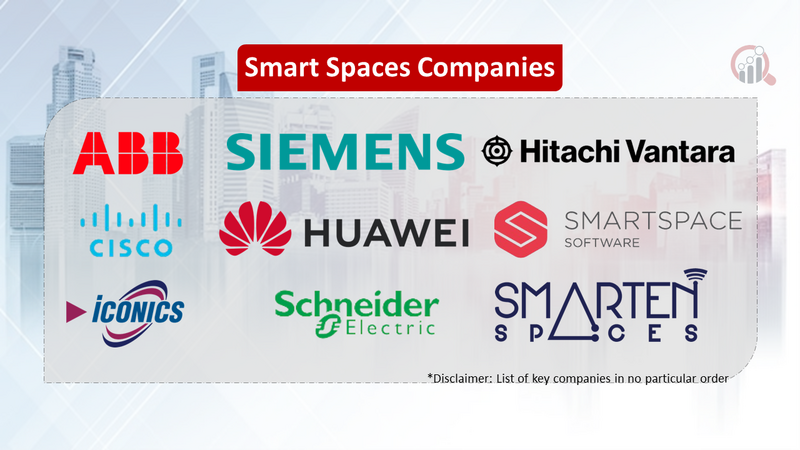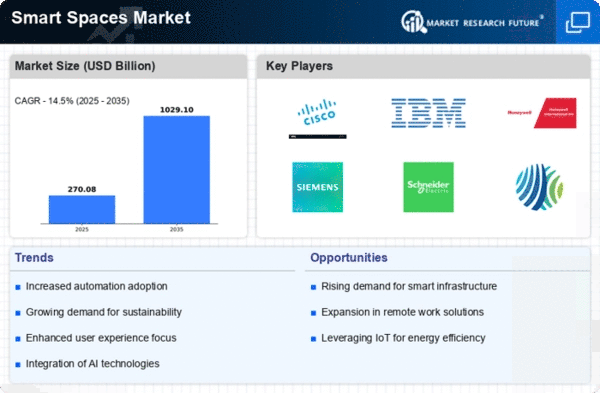Top Industry Leaders in the Smart Spaces Market

Competitive Landscape of the Smart Spaces Market:
The burgeoning smart spaces market, encompassing connected technologies that optimize various aspects of physical environments, is currently witnessing a dynamic and intricate competitive landscape. Several established players vie for dominance, while innovative startups carve new niches. Understanding this competitive terrain is crucial for navigating the market's intricacies and formulating successful strategies.
Key Players:
- ABB (Switzerland)
- Cisco Systems (US)
- ICONICS (US)
- Coor (Sweden)
- Siemens AG (Germany)
- FASEAS SPACEWELL (Belgium)
- Eutech Cybernetic (Singapore)
- Huawei Technology (China)
- Schneider Electric (France)
- Smarten Spaces (Singapore)
- Smart Space Software (UK)
- Hitachi Vantara Corporation (US)
- Ubisense (UK)
- Adappt (US)
Strategies Adopted:
- Ecosystem Building: Leading players are actively building vibrant ecosystems by collaborating with hardware manufacturers, software developers, service providers, and other stakeholders. This fosters innovation, expands product portfolios, and enhances customer value propositions.
- Openness and Interoperability: The industry is shifting towards open standards and APIs to ensure compatibility and interoperability between diverse smart space components. This empowers developers and users to create customized solutions, fostering a more dynamic and competitive market.
- Data-Driven Insights: Leveraging the abundant data generated by smart spaces, companies are offering AI-powered analytics and insights to optimize energy consumption, enhance security, and improve occupant comfort. This data-driven approach is a key differentiator in the market.
- Vertical Specialization: Many players are focusing on specific verticals, such as healthcare, hospitality, or offices, tailoring solutions to address the unique needs and challenges of each segment. This verticalization enables deeper market penetration and customer engagement.
Factors for Market Share Analysis:
- Product Portfolio Breadth and Depth: Comprehensiveness and depth of offerings across applications and functionalities play a crucial role.
- Technology Leadership: Continuously innovating and integrating cutting-edge technologies like AI, IoT, and cloud computing is essential for maintaining a competitive edge.
- Brand Recognition and Reputation: Established brands hold an advantage in terms of consumer trust and market acceptance.
- Distribution Channels and Partnerships: Robust distribution networks and strong partnerships with key players in the value chain facilitate wider market reach and penetration.
- Pricing and Value Proposition: Offering competitive pricing while delivering substantial value through cost savings, improved efficiency, and enhanced user experience is critical for attracting and retaining customers.
New and Emerging Companies:
The smart spaces market is constantly attracting new entrants, particularly in niche segments and specialized applications. Some trends fueling this influx include:
- Focus on Sustainability: Startups offering solutions for energy efficiency, renewable energy integration, and carbon footprint reduction are gaining traction.
- Cybersecurity Focus: The rising concern over cyber threats in smart spaces is leading to increased demand for specialized security solutions and services, attracting cybersecurity startups to the market.
- Hyperlocal Solutions: Startups catering to specific regional needs and cultural preferences are emerging, offering localized smart space solutions for diverse markets.
Current Company Investment Trends:
- Cloud Infrastructure: Investments in cloud platforms and services to support data processing, analytics, and application delivery are on the rise.
- Artificial Intelligence: Research and development in AI algorithms for smarter automation, predictive maintenance, and personalized user experiences are a key focus area.
- Cybersecurity: Enhancing security features and protocols to mitigate vulnerabilities and protect against cyberattacks is a top priority for most players.
- Partnerships and Acquisitions: Strategic partnerships and acquisitions to expand product portfolios, access new markets, and acquire relevant expertise are becoming increasingly common.
Latest Company Updates:
January 9, 2024, Microsoft announces plans to invest $1 billion in smart spaces technologies, focusing on intelligent workplaces, retail experiences, and urban infrastructure.
January 4, 2024, Siemens launches MindSphere for Buildings, a new cloud-based platform for managing and optimizing building operations.
December 20, 2023, Honeywell partners with City of Columbus to implement smart city solutions, including intelligent traffic management and connected infrastructure.










